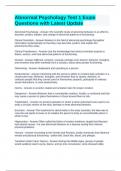Abnormal Psychology Test 1 Exam
Questions with Latest Update
Abnormal Psychology - Answer-The scientific study of abnormal behavior in an effort to
describe, predict, explain, and change of abnormal patterns of functioning.
Clinical Scientists - Answer-Workers in the field of abnormal psychology that gather
information systematically so that they may describe, predict, and explain the
phenomena they study.
Clinical Practitioners - Answer-Use the knowleadge that clinical scientists acquire to
detect, assess, and treat abnormal patterns of functioning.
Deviant - Answer-Different, extreme, unusual, perhaps even bizarre; behavior, thoughts,
and emotions that differ markedly from a society;s ideas about proper functioning.
Distressing - Answer-Unpleasant and upsetting to a person.
Dysfunctional - Answer-Interfering with the person's ability to conduct daily activities in a
constructive way; Behavior, thoughts, and emotions that so upsets, distracts, or
confuses people that they cannot care for themselves properly, participate in ordinary
social interactions, or work productively.
Norms - Answer-A society's stated and unstated rules for proper conduct.
Dangerous - Answer-Behavior that is consistently careless, hostile, or confused and that
may cause a person to place themselves or those around them at risk.
Trephination - Answer-An ancient operation in which a stone instrument was used to cut
away a circular section of the skull, perhaps to treat abnormal behavior.
Exorcism - Answer-The treatment for abnormality in the early societies; the idea was to
coax the evil spirits to leave or to maakke the person's body an uncomfortable place in
which to live.
Hippocrates - Answer-Often called the father of modern medicine; taught that illnesses
had natural causes - he saw abnormal behavior as a disease arising from internal
physical problems.
Humors - Answer-According to the Greeks and Romans, bodily chemicals that influence
mental and physical functioning - yellow bile, black bile, blood, and phlegm.
Tarantism (Saint Vitus' Dance) - Answer-During the Middle Ages, groups of people
would suddenly start to jump, dance, and go into convulsions; some dressed oddly,
,while others tore off their clothes; All where convinced they had been bitten and
possessed by a wolf spider, and they sought to cure the disease by performing this
dance.
Lycanthropy - Answer-A form of mass madness from the Middle Ages in which people
thought they were possessed by wolves or other animals; they acted wolflike and
imagined that fur was growing all over their bodies; they were known as lycanthropes or
WEREWOLVES.
Asylums - Answer-A type of institution that first became popular in the 16th century to
provide care for persons with mental disorders. Most became virtual prisons.
Moral Treatment - Answer-A 19th century (Pinel and Tuke) approach to treating people
with mental dysfunction that emphasized moral guidance and humane and respectful
treatment.
Dorothea Dix - Answer-Boston schoolteacher who made humane care a public and
political concern in the United States. She personally helped est. 32 state hospitals.
Somatogenic Perspective - Answer-The view that abnormal psychological functioning
has physical causes.
Psychogenic Perspective - Answer-The view that the chief causes of abnormal
functioning are psychological.
Hypnotism - Answer-A procedure that places people in a trance-like mental state during
which they become extremely suggestible. Its study lead to the gain of following of the
psychogenic perspective.
Hypnotic Suggestion - Answer-According to Bernheim and Liebault, a mental process
could both cause and cure even a physical dysfunction.
Psychoanalysis - Answer-Either the theory or treatment of abnormal mental functioning
developed that emphasizes unconscious psychological forces as the cause of
psychopathology. The treatment, developed by Sigmund Freud, is a form of discussion
in which clinicians help troubled people gain insight into their unconscious psychological
processes.
Outpatient Therapy - Answer-A format of treatment used by Freud, in which pts visited
therapists in their offices for sessions of approximately an hour and then went about
their daily activities.
Psychotropic Medications - Answer-Drugs that mainly affect the brain and reduce many
symptoms of mental dysfunctioning.
, Positive Psychology - Answer-The study and enhancement of positive feelings, traits,
and abilities.
Multicultural Psychology - Answer-The field of psychology that examines the impact of
culture, race, ethnicity, gender, and similar factors on our behaviors and thoughts and
focuses on how such factors may influence the origin, nature, and treatment of
abnormal behavior.
Managed Care Program - Answer-A system of health care covergae in which the
insurance company largely controls the nature, scope, and cost of medical or
psychological services.
Psychiatrists - Answer-Physicians who complete 3 or 4 additional years of training after
medical school (residency) in the treatment of abnormal mental functioning.
Clinical Psychologists - Answer-Professionals who earn a doctorate in clinical
psychology by completing 4 years of graduate training in abnormal functioning and its
treatment and also complete a one-year internship at a mental hospital or mental health
agency.
Case Study - Answer-A detailed account of a person's life and psychological problems.
neurotransmitter - Answer-A chemical that, released by one neuron, crosses the
synaptic space to be received at receptors on the dendrites of neighboring neurons.
hormones - Answer-The chemicals released by endocrine glands into the bloodstream.
psychosurgery - Answer-Brain surgery for mental disorders
free association - Answer-A psychodynamic technique in which the patient describes
any thought, feeling, or image that comes to mind, even if it seems unimportant.
transference - Answer-According to psychodynamic theorists, the redirection toward the
psychotherapist of feelings associated with important figures in a patient's life, now or in
the past.
operant conditioning - Answer-A process of learning in which an individual acquires
responses by observing and imitating others.
modeling - Answer-A process of learning in which an individual acquires responses by
observing and imitating others.
classical conditioning - Answer-A process of learning by temporal association in which
two events that repeatedly occur close together in time become fused in a person's
mind and produce the same response.




